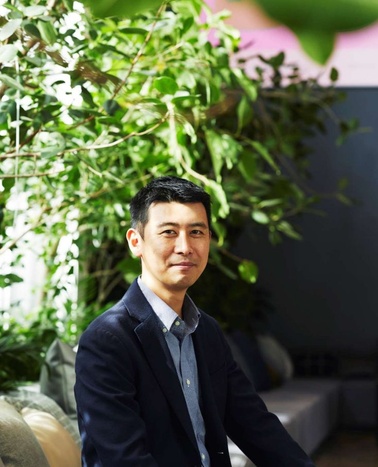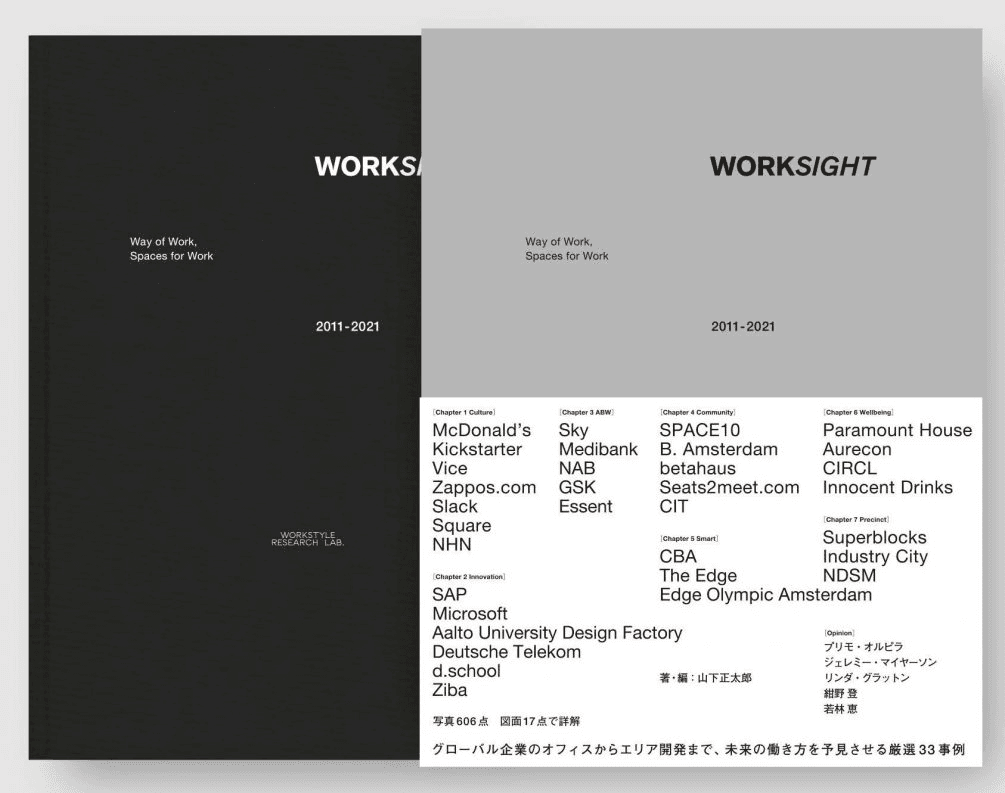
Yuki Kanamori
Yuki joined Kokuyo Co., Ltd. after graduating in 2005 from Sonoma State University in California, CA, USA (B.A. in Geography). After working in the business development and marketing divisions of the office furniture business, he has joined “WORKSIGHT,” a media that solves the working
style and office environment of a globally growing company since 2012. His responsibility is research on global workplaces trend. Yuki is a member of work style research institute of KOKUYO called “Workstyle Lab.” He completed a Master’s degree in IE School of Architecture & Design in Spain in 2019, specializing in workplace consulting. Yuki works as a workplace consultant and research coordinator with numerous contacts with overseas research institutions, companies, design & architectural firms.
"The IE Alumni community is a gateway to the world."
Q&A WITH YUKI
Define your experience in the Master in one word.
Experience
I never would have imagined the experience I had during my Master, it was fantastic. I never imagined that I would be surrounded by so many sophisticated teachers and talented classmates.
What were some of the main challenges that you encountered on your way? How did your master program and IE help you through these challenges?
The most difficult part for me, unlike my classmates, is that they were already designers or architects and I wasn’t. I am more of an editor working at WORKSIGHT magazine for a while. I have visited many office spaces around the world from North America, Europe, Australia, and Asia, so I have enough experience to know what offices are. However, during this program there was a lot of computer work like rendering, AutoCAD, among others. The software skills were the most difficult during my Master. However, the great thing about this program is that we mainly did group work (group of 4 students). The structure was well organized, as I was not the only one in my class who was not familiar with AutoCAD or 3D rendering, and luckily with my team we had talented classmates who were really good with the software and helped a lot.
How did your experience at IE prepare you for your professional career? In what ways do you think program has changed your life professionally and personally?
I have been in the office furniture industry ever since I finished my undergrad education. When I joined IE, I already had more than 10 years of experience in the office world; however, that was mainly in Asia and Japan, as most of the sales from my company come from Japan. About 90% and more. So, I didn’t really know the global standards of the workplace industry. During this program there was a talented teacher from Studio O+A, the best workspace design firm, and from Gensler. When I was in japan, before I joined the IE program, I was looking at case studies on the website and didn’t know the levels. But during the program I got to talk to them and visit the firms in the case studies and here is the best of the best in the world.
What was networking like in the program?
I work with one of the teachers I had. The office industry and workplace industry are very big all around the world, but the people there are very limited, and the main people are at IE 🙂
When I wanted to do the magazine, I called one of the professors and ended up working with them. We also have a client in Japan that wanted an international designer and I connected them. So now I work with my professors.It’s a big world, but very small.
What was your favorite memory from your time at IE?
The majority of this program was based in Madrid and online, but there was one summer we spent 3 weeks in London. We had 3-straight days of group work and spent time at one of the companies and did ethnographic fieldwork with a clipboard and observed the workspace, the people working in it, and analyzed it. That was very interesting. We visited GSK, this huge building close to Heathrow airport. And GSK is one of the major pharmaceutical companies, I have always been an admirer of the building and had the chance to stay there for 3 days and document the workspace, it was quite a fascinating experience for me.
If someone was considering going to IE, what would you tell them?
Have fun! Become friends with the teachers and classmates because you will most likely work with them when you finish the program.
Why did you choose to study this program at IE?
It was the best and the only program in the world like this. That was the beauty part of IE, when I was looking at different programs, this was the only one program in the world that teaches workplace consulting on a master level. I saw that there were several in North America, but were more facility management oriented, not like design, workplace, and consulting. That’s why IE’s program is in the centre of the world.
What is one thing you wished you knew, when you were a student? What advice would you give to students who are about to begin the program?
I would recommend knowing technical skills and knowing AutoCAD, 3D rendering, etc. There was a design course where you designed on the laptop and I didn’t really have the knowledge to use AutoCAD 3D rendering. If I could go back in time, I should have learned the software skills before joining the program, I should have done a bootcamp. I think I would have been able to learn more in detail if I had these technical skills.
Additionally, I had 10 years of experience in the industry already, but it is important to have several years of experience before going into the Master. Then you know how office spaces are designed, what office furniture is, and how businesses run, with having this basic knowledge or experience your experience as a student can be enhanced further.
One of the reasons I recommend having experience is that many of my classmates wanted new jobs or a more professional career and during the program they sent a lot of resumes, but many of my classmates had a difficult time with only just finishing their educations. I think if they had several years of experience, they would have had a less difficult time in finding a job.
Tell us about the IE alumni community and the impact they have had in your life and/or career. Why do you think it’s important to engage with the IE alumni community?
It’s a gateway to the world and new business. I am in Japan, really far from Europe on a really tiny island, everything is on that island. During the program, I met a lot of people and now I have a really great community. If I ever want to know what’s going on in the world, especially now during COVID-19, I cannot travel, now I just WhatsApp them and ask what the situation is like in London, for example, and they tell me. Now working on the magazine and needing to explain to clients about office spaces from around the world, the community is a major source of information for me.
You have been with KOKUYO for many years, can you share your experience working there?
When I joined KOKUYO, I did several jobs, I did sales, marketing, and now I do the magazine and I am a research coordinator. The magazine is really great, WORKSIGHT magazine is a workplace research magazine published by KOKUYO.
The magazine highlights 10 years of my work.
Since COVID-19, we weren’t able to travel and were not able to do our regular magazine, so we took this pandemic as an opportunity in a positive way and created a book looking at the past 10 years of workplace history in the world.
Click here to learn more about WORKSIGHT
To purchase the book CLICK HERE
Can you tell us what a day look like for you?
Before COVID-19, my job was to look for and research the latest workplaces around the world. We would then travel with a photographer and spend a lot of time overseas visiting fantastic workplaces and then create the magazine. And now everything has changed, right now I am working on the book and doing a lot more editorial work before the release. Additionally, I am member of the Innovation Centre in Tokyo, talking about future businesses. My job role has slightly changed.
At the same time, our clients want to know the latest workplaces around the world during COVID-19. So, I reached out to the IE community and the people I met during previous WORKSIGHT magazine interviews to get some insights and pictures and then I am able to explain what is happening in the world during COVID-19 to our clients. I wanted to travel, but we are stuck at home for now and do my best.
What has been your favourite moment of your career so far?
Visiting new workplaces and visiting new people, this is the best part.
I have had the chance to visit workplaces all over the world. As a team (group of 2-3 people), we have been to 30 countries, 50 cities, and 1000 office spaces in the past 10 years including Japan, Asia, Europe, and North America. There aren’t any many workspace magazines around the world, and we are one of them.
What’s a valuable lesson you have learned throughout your career?
That people matter, we have been talking about community and good people in the program. During COVID-19 it’s difficult to start new businesses or relationships with new people.
Meeting people, getting to know them, coming up with ideas, and visiting each other is important lesson to enhance careers and life itself.
Are there any daily habits that you attribute to your success that you’d like to share, especially now with COVID-19?
Meditation… There is an app, my favourite app called Headspace. With COVID-19 you are stuck at home and you can only talk to people through this tiny webcam on the screen and its really difficult to manage physically and emotionally. Speaking from an emotional part, meditating is a new habit that I have started in the past year and I have found that I have a more peaceful mind. It is interesting that tech helps and that an app helps. You would never imagine that an app would help with meditation, because you would think it would be more like practicing yoga or taking a class where you learn from a teacher, and now that’s the old world. The new world, an app is your teacher and I find it to be an interesting experience.
There literally is an app for everything : )
What’s the best career advice you have ever been given?
I remember when I was 19, I had a history teacher in the US, and he said, “a specific problem has a specific solution, look for it.” And I think that was the best career advice and life advice.
If you had a billboard you could display to the entire world, what would you put on it?
Be unique!
I have a story behind that. My organization KOKUYO has more than 110 years of history, and their corporate philosophy was a more product-oriented philosophy and now it’s Be Unique. That’s because if you look at Japan, it always used to be: there is only one way of doing things. Now with so many changes in the world and diversity and inclusion, “difference” is good. In Japan, for a long time “difference” was bad. So, our company is trying to change that and be unique in workplaces and workstyles and I like that word. I would like to tell the world to be unique.
